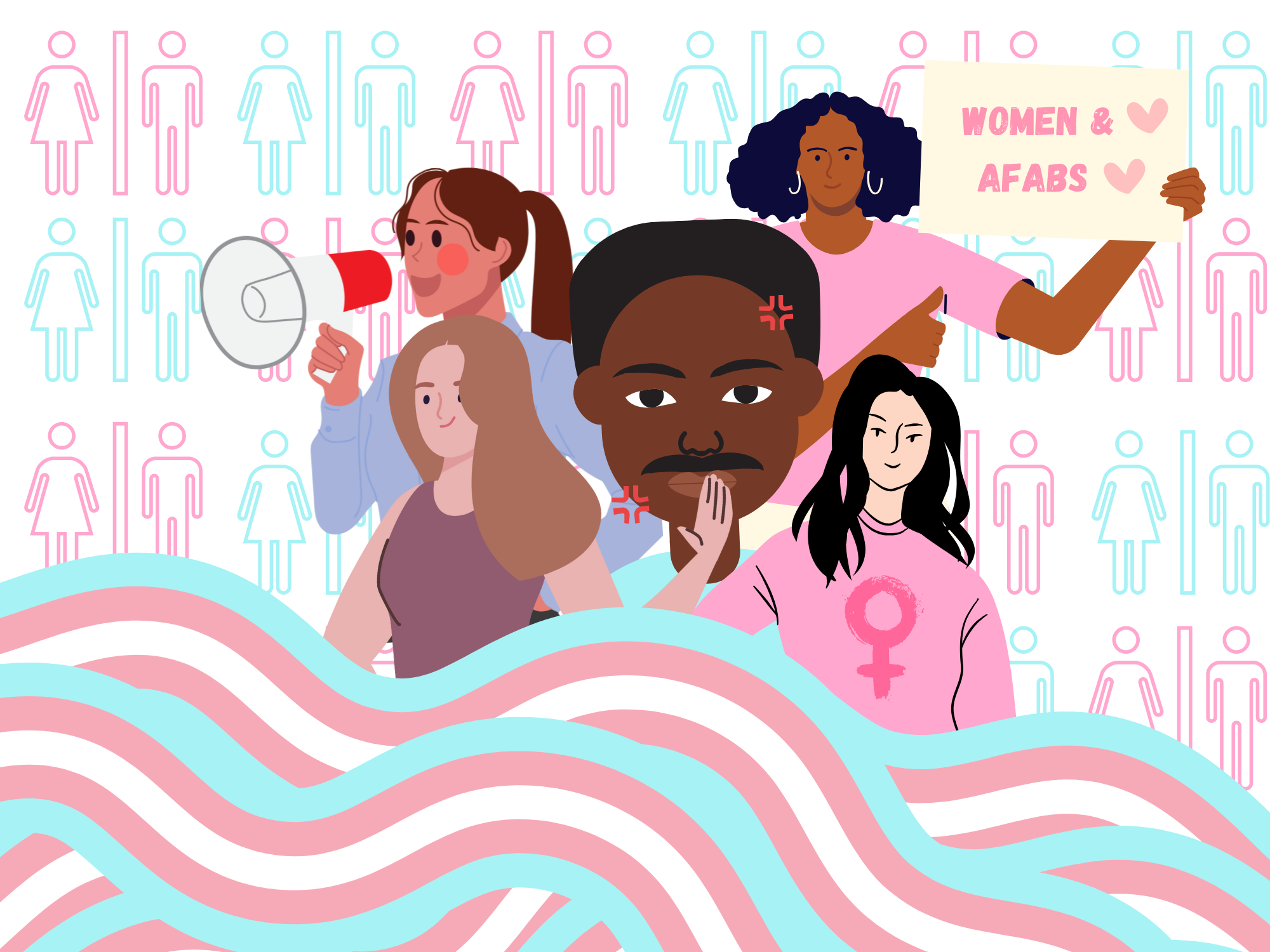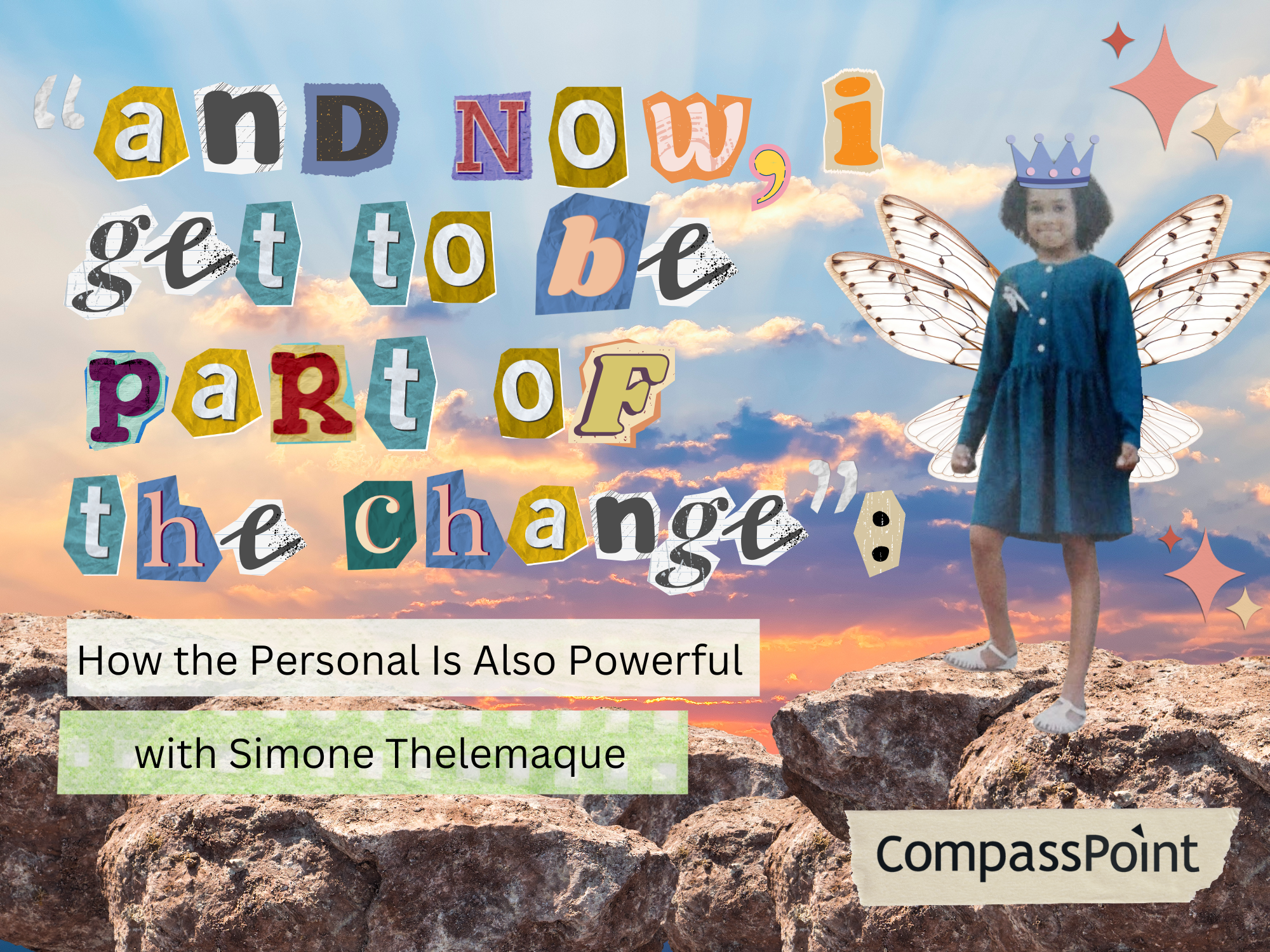[Image description: An illustrative graphic of a Black man surrounded by women. One woman carries a loudspeaker, one woman waves her hand, another woman wears a sweater with the female symbol emblazoned on it, and yet another holds a sign that reads “Women & AFABs.” The backdrop features blue and pink male/female symbols that are typically seen on bathroom signs. There are blue, pink, and white rainbow squiggles in the foreground, reminiscent of the trans pride flag.]
CompassPoint's Capacity Building & Consulting Team Member Joe Jackson reflects on how cisgender people's relationship to gender can come at the expense of trans people while ultimately costing gender liberation for everyone.
by Joe Jackson with Learkana Chong
In social justice spaces, we often say multiple truths exist at once. It’s true that as a Black transgender man I don’t lead a single-issue life: I don’t view my Blackness as separate from my transness, and neither are separate from my manhood. And it’s also true that when I walk down the street, people only see a Black man and interact with me as such, given that I have a “gender-conforming” appearance.
Yet, certain encounters I’ve experienced have attempted to suggest otherwise. Cisgender people, particularly cisgender women—in both my personal and professional circles—are quick to interject whenever we are in conversation about gender dynamics and I attempt to offer my perspective as a man. “Well you’re transgender, it’s different,” they say.
When these interruptions occur, I usually don’t say anything in response—I just change the subject and pretend they didn’t happen. Often, I feel shut down. For a while, I wasn’t sure why these interactions didn’t feel good, other than feeling like they were dismissive of my daily life experiences.
Another part of what’s been bothering me is that these invalidating comments usually come from people I consider friends or respected colleagues, and otherwise progressive in their beliefs and values. Why did they feel so comfortable with casually denying my own lived experiences of my gender?
It’s true that as a Black transgender man I don’t lead a single-issue life: I don’t view my Blackness as separate from my transness, and neither are separate from my manhood.
A few weeks ago, I shared with some trans friends of mine the most recent incident of a (cis woman) friend cutting me off mid-conversation to shut down my experience of being a man. They affirmed what I experienced was a transphobic microaggression. “That’s not an ally,” one friend said bluntly. “That type of microaggression is not something that someone who otherwise values trans folks would say.”
I think my friend is right. If there’s any part of a cis person that wants to tell me that I don’t get to speak to my own gendered experience and align it with the experiences of men in general simply because I’m trans, then that kind of thinking cannot come from any place of allyship. Upon further reflecting on these incidents, I have realized these well-meaning cis people weren't just being dismissive of my lived experiences; their interruptions, which sought to explicitly center differences when I as a trans person had been focused on commonalities between gendered experiences, were a way to police my relationship to gender by imposing their heteronormative, patriarchal, and cissexist beliefs onto my reality.
To put it more plainly, the tension here is between my actual lived experiences of my gender, versus cis people’s ideas of what they think my gender is. When I get told I cannot include my experiences as part of what men in general may be dealing with, the quiet part of what’s being said is, “You’re not really a man.” Furthermore, a cis person who interrupts me to say that I cannot speak from the perspective of a man because I am trans, is operating from an uninterrogated assumption that they, as a cisgender person, have the authority to dictate what gender is or isn’t for trans people.
On a larger scale, this assumption that cisgender people alone get to define gender has already been playing out in our political landscape with disastrous and violent consequences for people like me (not to mention intersex people, who are erased every single time cisgender people impose a gender binary onto biological sex). Microaggressions from “allies” and macroaggressions from anti-trans politicians share an underlying belief that cis people have the right to police the boundaries of any and all gendered experiences in ways that specifically exclude trans people. By enforcing a strict categorical separation of experiences between trans and cis folks, whether socially or legislatively, trans people as a whole are marked as an illegitimate, illegible “Other”—even when there is overlap between and across the lived experiences of both trans and cis people, because all of us on a fundamental level have a shared humanity.
Microaggressions from “allies” and macroaggressions from anti-trans politicians share an underlying belief that cis people have the right to police the boundaries of any and all gendered experiences in ways that specifically exclude trans people.
All of this to say: the authoritarian regime currently in office that seeks to erase the facthood of my very existence is not the only thing that needs to be rooted out in our fight for our freedoms. The false belief that being cisgender automatically comes with special subject matter expertise and gatekeeping privileges of gender, especially over trans people, must also be rooted out if we are serious about gender liberation for everyone, cis and trans folks included.
As much as it’s been repeated to perhaps the point of ringing hollow lately, it is a fundamental truth that our struggles are intertwined. In order for the world to be free of transphobia, it must also be free of sexism and patriarchy. Transphobia, as well as homophobia, are the logical outcomes of a sexist and rigid gender belief system. When gender and sex are policed, trans and queer people (particularly trans women and femmes) face the brunt of the violence, given that we are seen outside the gendered and sexed boundaries created to keep people boxed in. Trans people especially are seen as visual assaults to this system of gender policing.
Unfortunately, rather than building solidarity with trans people in the struggle against gender-based oppression, some cis women choose to uphold that oppression against trans people instead, in both subtle and overt ways. And many cis men, rather than recognizing that sexism hurts them as well, choose to enact patriarchal violence on cis women, trans people, and ultimately themselves.
In order for the world to be free of transphobia, it must also be free of sexism and patriarchy.
At the end of the day, these rigid, cisheteronormative gender roles hurt everyone. It is repressive to abide by a doctrine that states we must present or perform a certain way based on an invasive assumption of what is between our legs. And yet, trans people become the biggest scapegoats of those who follow this doctrine because our very existence disrupts and violates its authoritarian principles of conforming to society’s expectations and definitions of who we must be. In this way, fascism and transphobia are linked.
Cisgender people who want to be in solidarity with trans people must recognize that 1) trans people have the right to define our gender and gendered experiences for ourselves, and 2) gender is not the private property of cisgender people, and trans people are not trespassers of this imagined property. Solidarity from cis people begins with building some self-awareness and critically reflecting on the explicit and implicit ways in which cis people as individuals uphold a strict gender binary that locks out trans people. If you are cisgender, to what extent do you believe and behave in a manner that asserts you can, should, and do define other people’s gendered experiences for them? Start unpacking the why behind this, and then maybe we can get somewhere.
Cisgender people who want to be in solidarity with trans people must recognize that 1) trans people have the right to define our gender and gendered experiences for ourselves, and 2) gender is not the private property of cisgender people, and trans people are not trespassers of this imagined property.
The gender ideology many of us have been taught to believe and practice is one created by patriarchal, cisgender people bent on suppressing freedom of expression and exploration in favor of controlling how people relate to themselves and one another. Perhaps it follows that our self-determination as trans people lies in abandoning the concept of gender altogether, as some radical trans folks have argued. Until that happens, however, one site of resistance to a dominating cisgender-centered framework of gender is the restructuring of this framework so that it is expansive and fluid, with enough room to fit the spectrum of gendered experiences of both trans and cis people—including the places where our experiences not only diverge, but overlap.






Submit a comment